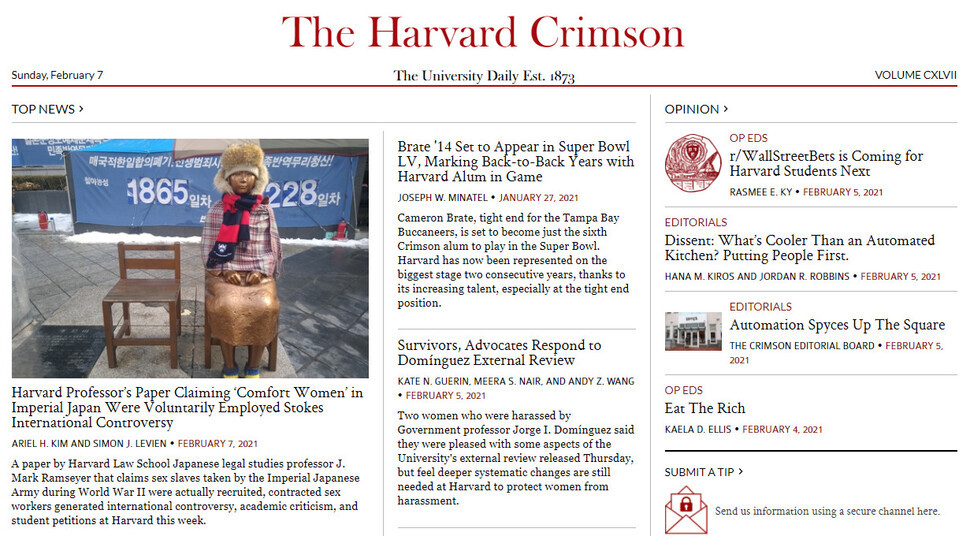hankyoreh
Links to other country sites 다른 나라 사이트 링크
Academic paper that smears comfort women is "woefully deficient," Harvard professors say

Serious issues with a paper by Harvard Law School professor J. Mark Ramseyer describing women sexually enslaved by the Japanese military as “voluntary sex workers” are drawing criticisms even within the university.
On Feb. 7, the Harvard Crimson, the university’s newspaper, published an article highlighting criticisms of Ramseyer’s argument, which it described as a source of global controversy.
Carter Eckert, a professor teaching Korean history at Harvard, called Ramseyer’s paper “woefully deficient, empirically, historically, and morally” and said he and fellow history professor Andrew Gordon were working on a piece for the same journal to rebut Ramseyer’s claims.
Alexis Dudden, a history professor at the University of Connecticut who reportedly took a class with Ramseyer at the University of Chicago in the 1990s, called his paper a “poorly resourced, evidentially fatuous piece of scholarly production.”
“It is conceptually misguided, because he’s not understanding not only the context, but what actually happened,” she contended.
Korean students at Harvard have also been increasingly vocal in their criticism of Ramseyer. In a Feb. 4 statement, the Korean Association of Harvard Law School (KAHLS) said it “strongly condemn[s] the deliberate erasure of human rights violations and war crimes.” Eight hundred US law students also added their signatures to the statement.

The Harvard College Korean International Students Association (KISA) plans to submit a petition to the university to demand Ramseyer’s apology.
In response to the outcry, Ramseyer said he had a “responsibility to the students at the Law School” and was prepared to discuss the paper with students.
Ramseyer touched off an international controversy with a paper titled “Contracting for Sex in the Pacific War,” which claimed that so-called “comfort women” demanded short-term contracts because they were traveling to battlefields, while business operators demanded contracts providing incentives to the women.
He also claimed that operators and women signed one- and two-year contracts with large advance payments and that the women were allowed to leave once they had made enough profits.
By Choi Hyun-june, staff reporter
Please direct comments or questions to [english@hani.co.kr]

Editorial・opinion
![[Editorial] Penalties for airing allegations against Korea’s first lady endanger free press [Editorial] Penalties for airing allegations against Korea’s first lady endanger free press](https://flexible.img.hani.co.kr/flexible/normal/500/300/imgdb/original/2024/0502/1817146398095106.jpg) [Editorial] Penalties for airing allegations against Korea’s first lady endanger free press
[Editorial] Penalties for airing allegations against Korea’s first lady endanger free press![[Editorial] Yoon must halt procurement of SM-3 interceptor missiles [Editorial] Yoon must halt procurement of SM-3 interceptor missiles](https://flexible.img.hani.co.kr/flexible/normal/500/300/imgdb/child/2024/0501/17145495551605_1717145495195344.jpg) [Editorial] Yoon must halt procurement of SM-3 interceptor missiles
[Editorial] Yoon must halt procurement of SM-3 interceptor missiles- [Guest essay] Maybe Korea’s rapid population decline is an opportunity, not a crisis
- [Column] Can Yoon steer diplomacy with Russia, China back on track?
- [Column] Season 2 of special prosecutor probe may be coming to Korea soon
- [Column] Park Geun-hye déjà vu in Yoon Suk-yeol
- [Editorial] New weight of N. Korea’s nuclear threats makes dialogue all the more urgent
- [Guest essay] The real reason Korea’s new right wants to dub Rhee a founding father
- [Column] ‘Choson’: Is it time we start referring to N. Korea in its own terms?
- [Editorial] Japan’s rewriting of history with Korea has gone too far
Most viewed articles
- 160% of young Koreans see no need to have kids after marriage
- 2Months and months of overdue wages are pushing migrant workers in Korea into debt
- 3[Editorial] Penalties for airing allegations against Korea’s first lady endanger free press
- 4Bills for Itaewon crush inquiry, special counsel probe into Marine’s death pass National Assembly
- 5[Reporter’s notebook] In Min’s world, she’s the artist — and NewJeans is her art
- 6[Guest essay] Maybe Korea’s rapid population decline is an opportunity, not a crisis
- 71 in 3 S. Korean security experts support nuclear armament, CSIS finds
- 8S. Korea discusses participation in defense development with AUKUS alliance
- 9Cracks found in containment building of UAE nuclear power plant built by S. Korean companies
- 10Trump asks why US would defend Korea, hints at hiking Seoul’s defense cost burden